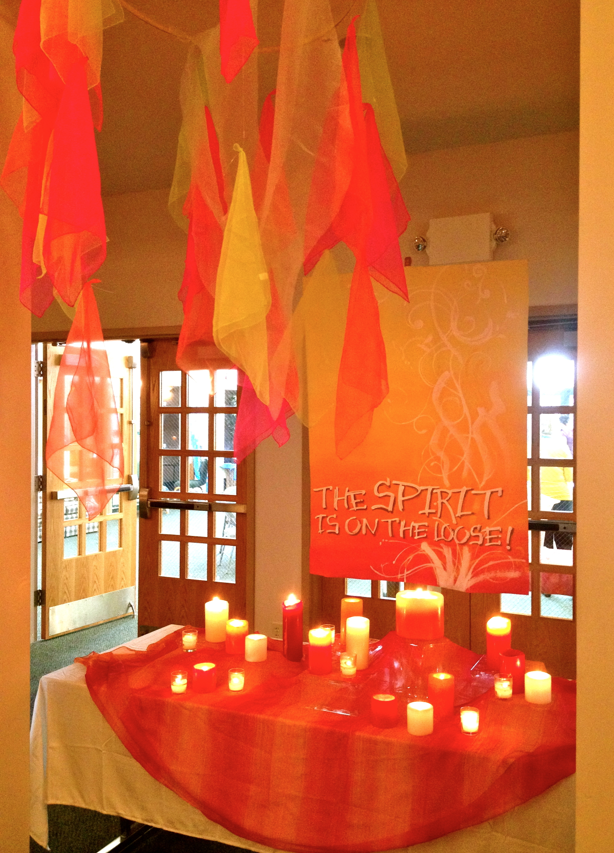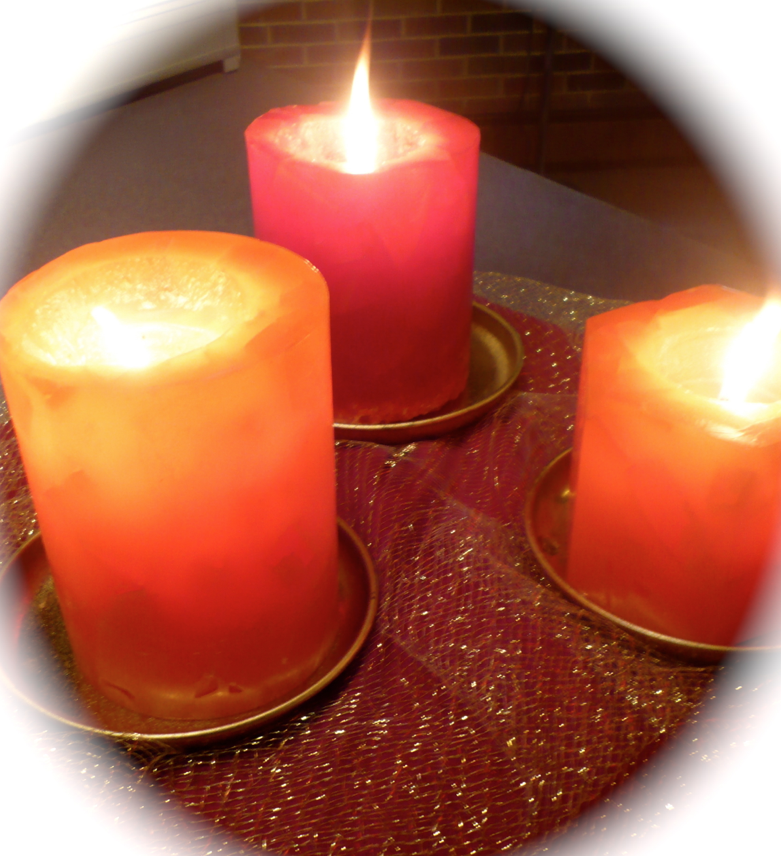Glimpses of Healing and Hope
May 29, 2017
By Jane Bishop Halteman

Pentecost worship visual created at Creekside Church of the Brethren, Elkhart, IN
Next Sunday we will observe Pentecost, which falls on the seventh Sunday after Easter and marks, on the liturgical calendar, the coming of the Holy Spirit and the birthday of the church. The annual festival also invites us as individuals to notice Divine movement in our individual lives and calls us to share stories of the Spirit on the loose.
For the disciples, now missing the physical presence of Jesus who had ascended 10 days earlier according to Biblical tradition, the descent of the Holy Spirit was a reminder that Jesus would always be with them; the wind and fire of the Spirit bolstered their courage to carry on the Kingdom work Jesus had begun.
Some years ago in a post at Mustard Seed Associates’ Godspace website, Christine Sine said this about Pentecost: “As the Holy Spirit fell on the disciples, the barriers of language and culture were broken down, not so that everyone thought and looked the same, but so that everyone understood each other in their own language and culture. This festival draws us beyond the resurrection to remind us that through the coming of the Holy Spirit we become part of a transnational community from every nation, culture, and social class.”
Joan Chittister, in her Essential Writings, adds this about the Spirit: “The Spirit of God moves us to new heights of understanding, to new types of witness, to new dimensions of life needed in the here and now. The static dies under the impulse of the Spirit of a creating God. We do not live in the past. We are not blind beggars on a dark road groping our separate ways toward God. There is a magnet in each of us, a gift for God that repels deceit and impels us toward good. The gifts are mutual, mitered to fit into one another for strength and surety.”
Pastor Janice’s sermon yesterday, based on verses 15-23 of Ephesians 1, seemed the perfect lead-up to next week’s Pentecost worship service as she spoke of how one’s personal sense of being the beloved child of God nourishes deep faith.
She compared developing faith to the escalating nature of a fireworks display, referencing South Bend’s Best. Week. Ever. fireworks event coming Friday (see Best. Week. Ever. schedule here). The first lone firework catches our attention, and ultimately the show crescendos to a grand finale as excitement builds. In similar fashion, she said, “Something comes into our lives like that first firework; the fireworks of God’s love continue to go off, (though) sometimes with long pauses between,” she acknowledged.
Based on the example set by my first spiritual director, I often have found myself asking a new directee whether or not she identifies as the beloved daughter of God. I recall journaling in bewilderment about that moment when my spiritual director asked me that question. Months, maybe even years later, the significance began to dawn on me, but initially, I found the question difficult to hear, imagining it presumptuous or perhaps even impertinent to claim myself beloved by the Divine.
In the words of Sarah Brock, writing for Episcopal Café, “It’s one thing to speak God’s love, another to know it, and entirely different to feel it deep in your soul. I have rarely set aside time and space to just be loved. Whether that love comes to us in a kind gesture from a neighbor, a hug at just the right moment, or in the silence of a holy place, it’s always there embedded in our souls, flooding into our awareness, sometimes when we least expect it.”
Pentecost, it seems to me, ritualizes the raining down of Divine love as the aggressive imagery of wind and fire promises not to desert us. The Ephesians passage from yesterday’s sermon, Janice said, reveals a high view of the church, the conduit by which the Divine message reaches others, “how love and mercy and grace get showered on the world. Fireworks are meant to be displayed in a crowd so we can ooh and aah with others!”
In the wake of tragedies like this past week’s Manchester suicide bombing, this article on How social ties make us resilient to trauma further reminds me that “as we struggle to find words to express our shock and sympathy for those who were harmed, we should not forget the healing power of building connections to each other.”
And this Parker Palmer post offers, in the spirit of Pentecost, a Rilke poem urging “us to live life to the fullest, fearing no danger, and ‘flaring up like flame’” so that we might “take life-giving risks as opportunity arises—life-giving not only for me but also for others. When I feel afraid to live that way, I turn to the poem’s final line, which reminds me that I can always find the comfort of companionship on the way.”
In what ways have you glimpsed the infinite, abundant companionship/love of the Divine and others on the journey? Have you taken stock of what might be impeding your view?

